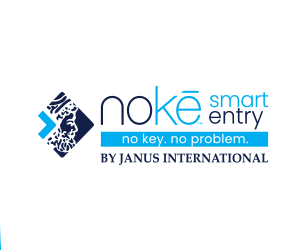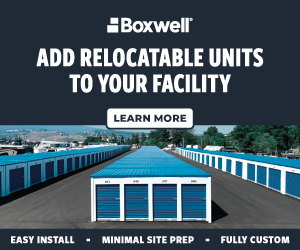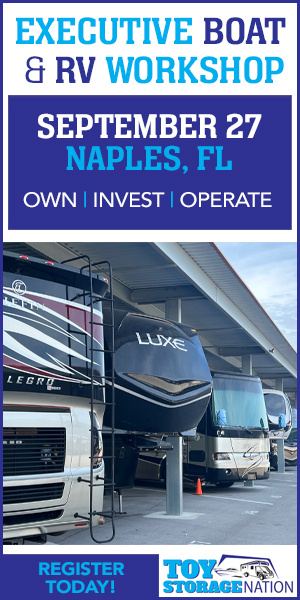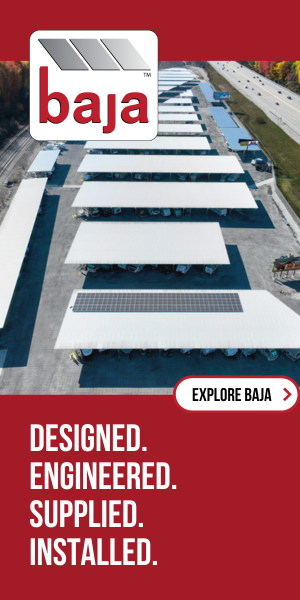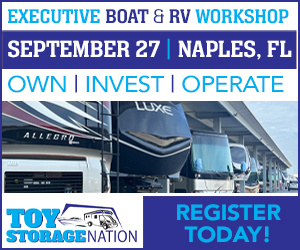By Brian Pascus
If the COVID-19 pandemic made one thing very clear — aside from an increased appreciation for the little things in life — it’s that we all need a bit more space.
With more than 330 million Americans hunkered in their homes for months at a time, the average house and apartment turned into a headquarters for virtually every daily activity that used to take place elsewhere.
As dens grew into home offices, and family rooms turned into classrooms, clutter became a way of life rather than merely a byword, and perceptions around self-storage changed from being viewed as the industrial sector’s awkward second cousin into one of the hottest sub-asset classes in all of commercial real estate.
One man had been waiting 20 years to pounce on the opportunity.
Brian Cohen, president and CEO of Andover Properties, carries a portfolio in excess of $2.8 billion worth of self-storage sites, manufactured housing communities, RV parks, car washes and other alternative asset classes.
The 46-year-old has trademarked the brand “Storage King USA,” owns more than 85,000 self-storage units that he rents out to customers, and, together with investment partners at Angelo Gordon, Fir Tree Partners and Blackstone (BX), has executed the purchase of more than 80 self-storage and alternative asset class properties since 2018.
“The demand has evolved,” explained Cohen in an interview with Commercial Observer. “It used to be that only 7 percent of the population used self-storage. Now we’re at 11 percent of the population utilizing [the asset class]. People have started to think about self-storage as their second garage or part of their home in recent times.”
With more than 157 properties spread across 12 million rentable square feet in 18 states (and counting), Cohen’s Andover Properties is one of the largest private owner operators of self-storage in the United States.
You wouldn’t know it by how he talks: Cohen is soft-spoken, measured, wears short-sleeved button-downs, and sports a dark beard. He becomes as animated when discussing his passion for gardening as he does when breaking down the ins and outs of commercial real estate finance. At times, he almost seems surprised to discuss how he’s carved out a corner for himself in the market of a deeply competitive asset class.
Not bad for a guy who didn’t win his first self-storage bid until 2009, and that after six years of trying.
“Brian’s one of the few people who’s been focused on this space for decades, and it’s become an in-favor asset class in the last five years or so,” said Adam Schwartz, co-CEO and head of global real estate at investment firm Angelo Gordon. “Other institutions have moved quickly to get into the self-storage space, but he’s got a real advantage in the relationships and knowledge he’s developed over the last two decades in the sector.”
Another business partner noted how Cohen has innovated an oft-ignored asset class.
“At a high level, I describe him as the best,” said Scott Glassberg, director of real estate private equity at Angelo Gordon. “He’s very smart, very forward thinking on the technology side. He recognizes that self-storage isn’t just a real estate business, but it’s an operational business.”
It’s not lost on Cohen how much the pandemic augmented what was an already successful business strategy.
“COVID hit and people needed more space in their homes, and one of the things that created the demand was people needing another office, or kids needing space, so self-storage became partly their second home,” he said. “It’s a lot more expensive to buy or rent a bigger apartment than it is to have your self-storage space down the road from you.”
By the year 2028, and largely thanks to habits formed during COVID, the U.S. self-storage market cap is expected to reach a valuation of $72 billion, up from $58 billion in 2023, according to Mordor Intelligence, a research firm in India.
However, according to Tyson Huebner, director of institutional research at Yardi Matrix, a U.S.-based analytics firm, that data excludes the largest public players in the space.
Given that larger, publicly traded self-storage portfolios have traded for $200 per square foot, Huebner estimated the entire U.S. market cap might be closer to $300 billion.
Cohen’s rise, however, is not merely the product of a large-scale shift in the way we live and how we organize our lives. His journey from amateur real estate investor to an indisputable sovereign of specific (if unconventional) asset classes is as much a story of persistence, foresight, business instincts and relationships as it is of luck and good fortune.
Because, as every reader of fairy tales knows, the king was once a countryman, too.
Self-starter
Cohen’s story has modest origins: it starts as a father-son tale.
After a three-year stint doing acquisitions and development for Tishman Speyer, Cohen decided in 2002 to go into business with his father, who had recently retired from decades working in the garment industry.
“I said, ‘I’m pulling you out of retirement. Come on, let’s join forces,’ ” recalled Cohen. “I needed someone with gray hair to come on board and help out with fundraising.”
The two Cohens set out to acquire old industrial buildings and turn them into revenue-generating multifamily properties. Father and son knew they’d need to raise capital and eventually bid on properties, but what surprised them was an epiphany Brian had in 2003 after examining a decaying self-storage facility in Greenpoint, Brooklyn.
Unlike an average multifamily conversion, the Greenpoint building didn’t need to change out its plumbing system, or require a renovation for each unit, or a paint job for the walls on every floor. For a self-storage facility, the outer shell is the main concern to improve upon purchase, as very little on the inside needs an overhaul. Moreover, after studying the asset class more, Cohen found that among the owners and operators already involved in the space during the early 2000s, there appeared to be a complete lack of sophistication from a technology and marketing standpoint.
“I went out to a self-storage conference in 2003, and it happened to be one of those eye-opening, awakening moments where you said to yourself, ‘Wow, the industry has a lot of big companies running some pretty large platforms, but it’s still mom-and-pop,’” said Cohen. “The only thing I realized they were doing for marketing was the yellow pages. They weren’t doing anything for data, and there was nothing being done for revenue management except in a simplistic fashion. People would price the ground-floor unit the same as the second-floor unit.”
Cohen and his father originally got into self-storage thinking it would be a good land banking business — essentially something to tear down and build another asset over. It now dawned on them that self-storage itself was a pretty good real estate product with attractive fundamentals.
“I like the fact that it has very few employees per asset, and one of the unique things about self-storage is it has the lowest amount of capital improvement dollars as part of net operating income out of all forms of commercial real estate classes,” the younger Cohen said. “Self-storage growth is about utilization and people knowing about it more. There are about five D’s that create the demand of self-storage: divorce, death, dislocation, density and disaster.”
Friends in high places
While Cohen might have had an intuition that self-storage would make a wise investment, it took him years to actually acquire the properties to turn his ideas into income.
While he spent the better part of the 2000s building and developing several self-storage facilities from scratch (using capital from several high-net-worth investors formed through relationships among family and friends of friends), he began in 2005 to bid on more than 100 properties — some within mini-portfolios, others single assets — in hope of acquiring a finished product to turn around. Aided by Schwartz, an old college buddy from the University of Pennsylvania, Cohen also began having high-level conversations with Angelo Gordon, one of the world’s largest alternative investment management firms with $73 billion of assets under management.
Even with Angelo Gordon’s financial backing, Cohen didn’t win a single bid during this three-year period, mainly because he wasn’t willing to pay the prices demanded in pre-Global Financial Crisis America.
“Everything was trading at scary valuations, and I thought people were believing too much in the future,” he said. “From 2006 to 2007, I was questioning whether my real estate acumen was really there, but, obviously, the GFC came around [in 2008 and 2009] and we sort of went on a buying spree.”
Together with Schwartz, Cohen began purchasing distressed loans backed by self-storage facilities. They bought deeds in lieu of foreclosure, knowing that as some properties went through the foreclosure process, they could lease up the others that still had life in them.
“Probably around or just before the GFC, we bought our first deal: buying a mortgage on four assets and basically taking them over and repositioning the assets,” recalled Schwartz. “Those were successful transactions for both of us, and we went on to build from there.”
After 2009, the partnership between Andover Properties and Angelo Gordon really took off. This relationship brought Cohen into the sphere of investors at Blackstone, the multinational private equity giant with $387 billion of assets under management, and Fir Tree Partners, a hedge fund with nearly $5 billion in its remit.
Today, Cohen estimates that roughly 40 percent of Andover Properties’ portfolio is in partnership with Angelo Gordon, 40 percent is with Blackstone, and the other 20 percent is with other institutional partners and high-net-worth investors.
But, even amid big-name investment partners, the father-son ethos remains part of the firm. Cohen’s father, William Cohen, remains chairman of Andover Properties today.
“Most of our deal flow is buying mom-and-pop facilities,” Cohen said. “Probably the last time we sold assets was 2020, though we’ve sold throughout the course of time as well.”
The most active period for Cohen came between 2017 and 2018, when Angelo Gordon used their Realty Fund X, capitalized at $2.8 billion, to buy more than 70 assets with Andover Properties.
“We did an aggregation strategy, buying one-off properties from mom-and-pop owners, and had Brian come in and take over and bring a much more institutional management approach to the assets,” explained Schwartz, who said they were able to materially increase the income and value of the assets simply from better management under Andover Properties.
This approach under Cohen’s direction included buying self-storage sites carrying excess land, developing additional density on-site, inaugurating institutional management practices for peak efficiency, concentrating more on daily management, and even occasionally selling performing assets in large portfolio sales.
“He has a more focused approach. He’s not a massive public company that owns thousands of facilities and can’t have the same day-to-day focus,” Schwartz said. “Just through that granular focus that Brian can have with his team, he’s been able to execute at a higher level.”
Angelo Gordon’s Glassberg noted the low capital expenditures of self-storage make for a frictionless experience for investors, and one with the added benefit of great cash flow: When tenants move out, a site manager sweeps their space and moves in new tenants, and begins collecting rent. That’s versus an office or an apartment building, each of which requires all sorts of changes and rehabilitations before cash can start pouring in again.
Glassberg added that the pandemic was actually good for his firm’s partnership with Andover Properties. “The new utilization of space within one’s own home has really driven the demand,” he said. “People are looking for additional space in their homes, and, on a chunk basis, it’s cheaper to pay for a 10-by-10 space than to pay their landlord for a third bedroom.”
Growing kingdom
Cohen has not limited himself simply to buying self-storage facilities and turning them around under his brand-name management. He has recognized that as the self-storage space has become more institutionalized over the last 10 years — and therefore more competitive — it makes sense to branch out into other, previously overlooked asset classes.
AN ANDOVER PROPERTIES SELF-STORAGE CENTER IN MARGATE, FLORIDA.
PHOTO CREDIT: ANDOVER PROPERTIES
For instance, the two largest self-storage companies in the country – Extra Space and Public Storage – are each valued at $46 billion and carry 1,000 more sites than their nearest competitor, according to Yardi Matrix.
To this end, the self-styled Storage King is now aiming to become an alternative asset monarch.
Cohen has formed joint-venture partnerships to buy manufactured housing communities (formerly known as trailer parks) and recreational vehicle parks.
“We’re 75 percent self-storage, but the strategy is trying to grow our other niche [asset] classes in commercial real estate,” said Cohen. “For manufactured housing, our goal is to really fix up properties, make them more inviting — whether through new lighting, new curbing, creating better drive aisles, creating better amenities. That’s our goal in manufactured housing.”
As for RV communities, Cohen believes that with government support (such as zoning changes, tax credits), they could become one of the most affordable housing options for a nation in dire need of available product. He noted that for $75,000 to $150,000, one can purchase an amenitized RV in a market where you typically have to pay $400,000 for a single-family home built atop a foundation.
“I truly believe it’s the way of the future,” he said. “Lots of cities and towns have manufactured housing, mobile home parks. And, while trailer parks have a bad connotation in people’s minds, the truth is it’s one of the best affordable housing options.”
He also noted that, during the pandemic, many Americans sold their homes and moved into an RV park, which has allowed them to hit the road and travel to different states, depending on the season and their own inclinations.
“There’s just a tremendous amount of advantages for lower cost of living,” he said. “Millennials were one of the biggest users of RVs during the pandemic. It’s not just catching on for the retirees.”
Cohen has also bought dry boat parking properties in Austin, Texas, and Orlando, Fla., as well as four car washes, and nearly 1 million square feet of small bay warehouse space.
But self-storage remains at the heart of his real estate empire. It’s where his comfort level and business acumen make his business partners feel most at ease and ready to invest.
Daniel Faust, a partner at law firm Holland & Knight, has worked with Cohen on several transactions as a real estate attorney. He noted that Cohen’s reputation as a “king” of self-storage is more than justified.
If anything, Faust implied that the title sells short his and his partners’ accomplishments within the sub-asset class. “Brian and his team are exactly that kind of leadership and level of sophistication that I know institutional capital is looking for in a partner, and in an operator and sponsor,” said Faust. “If I ever find myself with hundreds of millions of dollars like those private equity funds are looking to deploy, Andover Properties would be the absolute dream operator and sponsor given the way they run their shop and manage their assets.”
Brian Pascus is a reporter for the Commercial Observer. He can be reached at bpascus@commercialobserver.com.















